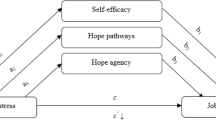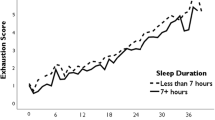Abstract
The effective management of stress and burnout is a key priority in promoting medical student wellbeing. Psychosocial factors like hope, stress, burnout, locus of control, and intellectual humility as well as lifestyle factors like exercise, sleep, idle time, downtime, and caffeinated beverage intake may be important in protecting against the negative consequences of stress and burnout. The purpose of this cross-sectional study was to explore the relationships between lifestyle factors and five different psychosocial wellbeing indicators. We sent a voluntary, online survey to first- through fourth-year allopathic and osteopathic medical students (n = 205). We used validated psychometric scales and investigator-created lifestyle questions to measure the variables of interest. Hierarchical linear regressions were used to examine the effects of the different variables’ associations with hope. We found that both exercise and sleep are potentially buffering the negative impact of high burnout on dispositional hope. We also found that having a high level of independence of intellect and ego may mitigate the negative effects of a more external locus of control on dispositional hope and may be protective of hope in people with higher stress. Future research can increase our understanding in this area by following medical students across time to control for any temporal effects on these variables and to determine if baseline characteristics can accurately predict future outcomes like burnout.


Similar content being viewed by others
Data availability
The datasets generated during and/or analyzed during the current study are available from the corresponding author on reasonable request.
References
Alhola, P., & Polo-Kantola, P. (2007). Sleep deprivation: Impact on cognitive performance. Neuropsychiatric Disease and Treatment, 3(5), 553–567.
Aronsson, G., Theorell, T., Grape, T., Hammarström, A., Hogstedt, C., Marteinsdottir, I., Skoog, I., Träskman-Bendz, L., & Hall, C. (2017). A systematic review including meta-analysis of work environment and burnout symptoms. BMC Public Health, 17(1), 264. https://doi.org/10.1186/s12889-017-4153-7
Bauer, G. F., Roy, M., Bakibinga, P., Contu, P., Downe, S., Eriksson, M., Espnes, G. A., Jensen, B. B., Juvinya Canal, D., Lindström, B., Mana, A., Mittelmark, M. B., Morgan, A. R., Pelikan, J. M., Saboga-Nunes, L., Sagy, S., Shorey, S., Vaandrager, L., & Vinje, H. F. (2020). Future directions for the concept of salutogenesis: A position article. Health Promotion International, 35(2), 187–195. https://doi.org/10.1093/heapro/daz057
Berglund, E., Lytsy, P., & Westerling, R. (2014). The influence of locus of control on self-rated health in context of chronic disease: A structural equation modeling approach in a cross sectional study. BMC Public Health, 14, 492. https://doi.org/10.1186/1471-2458-14-492
Berkman, E. T. (2018). The neuroscience of goals and behavior change. Consulting Psychology Journal, 70(1), 28–44. https://doi.org/10.1037/cpb0000094
Bernardo, A. B. (2010). Extending hope theory: Internal and external locus of trait hope. Personality and Individual Differences, 49(8), 944–949. https://doi.org/10.1016/j.paid.2010.07.036
Bravata, D. M., Watts, S. A., Keefer, A. L., Madhusudhan, D. K., Taylor, K. T., Clark, D. M., Nelson, R. S., Cokley, K. O., & Hagg, H. K. (2020). Prevalence, predictors, and treatment of impostor syndrome: A systematic review. Journal of General Internal Medicine, 35(4), 1252–1275. https://doi.org/10.1007/s11606-019-05364-1
Brick, C. A., Seely, D. L., & Palermo, T. M. (2010). Association between sleep hygiene and sleep quality in medical students. Behavioral Sleep Medicine, 8(2), 113–121. https://doi.org/10.1080/15402001003622925
Burr, J., & Dallaghan, G. L. (2019). The relationship of emotions and burnout to medical students’ academic performance. Teaching and Learning in Medicine, 31(5), 479–486. https://doi.org/10.1080/10401334.2019.1613237
Cheavens, J., Gum, A., & Snyder, C. R. (2000). The Trait hope scale. In J. Maltby, C. A. Lewis, & A. Hill (Eds.), Handbook of psychological tests (Vol. 1, pp. 248–258). Lampeter: Mellen Press.
Childs, E., & de Wit, H. (2014). Regular exercise is associated with emotional resilience to acute stress in healthy adults. Frontiers in Physiology, 5, 161. https://doi.org/10.3389/fphys.2014.00161
Cohen, S., Kamarck, T., & Mermelstein, R. (1983). A global measure of perceived stress. Journal of Health and Social Behavior, 24(4), 385–396.
Davis, D. E., Rice, K., Mcelroy, S., Deblaere, C., Choe, E., Tongeren, D. R., & Hook, J. N. (2015). Distinguishing intellectual humility and general humility. The Journal of Positive Psychology, 11(3), 215–224. https://doi.org/10.1080/17439760.2015.1048818
Demerouti, E., Bakker, A. B., Nachreiner, F., & Schaufeli, W. B. (2001). The job demands-resources model of burnout. The Journal of Applied Psychology, 86(3), 499–512.
Dolezal, B. A., Neufeld, E. V., Boland, D. M., Martin, J. L., & Cooper, C. B. (2017). Interrelationship between sleep and exercise: A systematic review. Advances in Preventive Medicine, 1–14. https://doi.org/10.1155/2017/1364387
Duncan, A. R., & Hellman, C. M. (2020). The potential protective effect of hope on students’ experience of perceived stress and burnout during medical school. The Permanente Journal, 24, 1. https://doi.org/10.7812/TPP/19.240
Dyrbye, L. N., Thomas, M. R., Huntington, J. L., Lawson, K. L., Novotny, P. J., Sloan, J. A., & Shanafelt, T. D. (2006). Personal life events and medical student burnout: A multicenter study. Academic Medicine, 81(4), 374–384. https://doi.org/10.1097/00001888-200604000-00010
Dyrbye, L. N., West, C. P., Satele, D., Boone, S., Tan, L., Sloan, J., & Shanafelt, T. D. (2014). Burnout among U.S. medical students, residents, and early career physicians relative to the general U.S. population. Academic Medicine, 89(3), 443–451. https://doi.org/10.1097/ACM.0000000000000134
Gilbert, D. T., & Malone, P. S. (1995). The correspondence bias. Psychological Bulletin, 117(1), 21–38. https://doi.org/10.1037/0033-2909.117.1.21
Halbesleben, J. R., & Demerouti, E. (2005). The construct validity of an alternative measure of burnout: Investigating the English translation of the Oldenburg Burnout Inventory. Work & Stress, 19(3), 208–220. https://doi.org/10.1080/02678370500340728
Harris, P. A., Taylor, R., Thielke, R., Payne, J., Gonzalez, N., & Conde, J. G. (2009). Research electronic data capture (REDCap)–a metadata-driven methodology and workflow process for providing translational research informatics support. Journal of Biomedical Informatics, 42(2), 377–381. https://doi.org/10.1016/j.jbi.2008.08.010
Harris, P. A., Taylor, R., Minor, B. L., Elliott, V., Fernandez, M., O’Neal, L., McLeod, L., Delacqua, G., Delacqua, F., Kirby, J., Duda, S. N., REDCap Consortium. (2019). The REDCap consortium: Building an international community of software platform partners. Journal of Biomedical Informatics, 95, 103208. https://doi.org/10.1016/j.jbi.2019.103208
Hill, M. R., Goicochea, S., & Merlo, L. J. (2018). In their own words: Stressors facing medical students in the millennial generation. Medical Education Online, 23(1), 1530558. https://doi.org/10.1080/10872981.2018.1530558
Hirotsu, C., Tufik, S., & Andersen, M. L. (2015). Interactions between sleep, stress, and metabolism: From physiological to pathological conditions. Sleep Science, 8(3), 143–152. https://doi.org/10.1016/j.slsci.2015.09.002
Jin, M. J., Yoon, C. H., Ko, H. J., Kim, H. M., Kim, A. S., Moon, H. N., & Jung, S. P. (2016). The relationship of caffeine intake with depression, anxiety, stress, and sleep in Korean adolescents. Korean Journal of Family Medicine, 37(2), 111–116. https://doi.org/10.4082/kjfm.2016.37.2.111
Jonas, W. B., Chez, R. A., Smith, K., & Sakallaris, B. (2014). Salutogenesis: The defining concept for a new healthcare system. Global Advances in Health and Medicine, 3(3), 82–91. https://doi.org/10.7453/gahmj.2014.005
Joris, P. J., Mensink, R. P., Adam, T. C., & Liu, T. T. (2018). Cerebral blood flow measurements in adults: A review on the effects of dietary factors and exercise. Nutrients, 10(5), 530. https://doi.org/10.3390/nu10050530
Krumrei-Mancuso, E. J., & Rouse, S. V. (2015). The development and validation of the comprehensive intellectual humility scale. Journal of Personality Assessment, 98(2), 209–221. https://doi.org/10.1080/00223891.2015.1068174
Krumrei-Mancuso, E. J., Haggard, M. C., Labouff, J. P., & Rowatt, W. C. (2019). Links between intellectual humility and acquiring knowledge. The Journal of Positive Psychology, 15(2), 155–170. https://doi.org/10.1080/17439760.2019.1579359
Kubota, J. T., Mojdehbakhsh, R., Raio, C., Brosch, T., Uleman, J. S., & Phelps, E. A. (2014). Stressing the person: Legal and everyday person attributions under stress. Biological Psychology, 103, 117–124. https://doi.org/10.1016/j.biopsycho.2014.07.020
Leary, M. R., Diebels, K. J., Davisson, E. K., Jongman-Sereno, K. P., Isherwood, J. C., Raimi, K. T., Deffler, S. A., & Hoyle, R. H. (2017). Cognitive and interpersonal features of intellectual humility. Personality & Social Psychology Bulletin, 43(6), 793–813. https://doi.org/10.1177/0146167217697695
Levenson, H. (1981). Differentiating among internality, powerful others, and chance. In H. M. Lefcourt (Ed.), Research with the locus of control construct (Vol. 1, pp. 15–63). Academic Press.
Maslach, C., & Jackson, S. E. (1981). The measurement of experienced burnout. Journal of Organizational Behavior, 2(2), 99–113. https://doi.org/10.1002/job.4030020205
Maslach, C., Schaufeli, W. B., & Leiter, M. P. (2001). Job burnout. Annual Review of Psychology, 52, 397–422. https://doi.org/10.1146/annurev.psych.52.1.397
Mosley, T. H., Perrin, S. G., Neral, S. M., Dubbert, P. M., Grothues, C. A., & Pinto, B. M. (1994). Stress, coping, and well-being among third-year medical students. Academic Medicine, 69(9), 765–767. https://doi.org/10.1097/00001888-199409000-00024
Moyo, M., Goodyear-Smith, F. A., Weller, J., Robb, G., & Shulruf, B. (2016). Healthcare practitioners’ personal and professional values. Advances in Health Sciences Education: Theory and Practice, 21(2), 257–286. https://doi.org/10.1007/s10459-015-9626-9
Naylor, R., Hayes, C., & Egger, G. (2013). The relationship between lifestyle, metaflammation, and chronic pain: A systematic review. American Journal of Lifestyle Medicine, 7(2), 130–137. https://doi.org/10.1177/1559827612451710
O’Sullivan, G. (2010). The relationship between hope, eustress, self-efficacy, and life satisfaction among undergraduates. Social Indicators Research, 101(1), 155–172. https://doi.org/10.1007/s11205-010-9662-z
Pavot, W., & Diener, E. (2004). Findings on subjective well-being: Applications to public policy, clinical interventions, and education. In P. A. Linley & S. Joseph (Eds.), Positive psychology in practice (pp. 679–692). Wiley.
Porter, T., Schumann, K., Selmeczy, D., & Trzesniewski, K. (2020). Intellectual humility predicts mastery behaviors when learning. Learning and Individual Differences, 80, 101888. https://doi.org/10.1016/j.lindif.2020.101888
Rand, K. L., Martin, A. D., & Shea, A. M. (2011). Hope, but not optimism, predicts academic performance of law students beyond previous academic achievement. Journal of Research in Personality, 45(6), 683–686. https://doi.org/10.1016/j.jrp.2011.08.004
Reis, D., Xanthopoulou, D., & Tsaousis, I. (2015). Measuring job and academic burnout with the Oldenburg Burnout Inventory (OLBI): Factorial invariance across samples and countries. Burnout Research, 2(1), 8–18. https://doi.org/10.1016/j.burn.2014.11.001
Rotter, J. B. (1954). Social learning and clinical psychology. Prentice Hall.
Rotter, J. B. (1966). Generalized expectancies for internal versus external control of reinforcement. Psychological Monographs, 80(1), 1–28.
Ruberton, P. M., Huynh, H. P., Miller, T. A., Kruse, E., Chancellor, J., & Lyubomirsky, S. (2016). The relationship between physician humility, physician-patient communication, and patient health. Patient Education and Counseling, 99(7), 1138–1145. https://doi.org/10.1016/j.pec.2016.01.012
Snyder, C. R. (2002). Hope theory: Rainbows in the mind. Psychological Inquiry, 13(4), 249–275. https://doi.org/10.1207/s15327965pli1304_01
Snyder, C. R., Harris, C., Anderson, J. R., Holleran, S. A., Irving, L. M., Sigmon, S. T., Yoshinobu, L., Gibb, J., Langelle, C., & Harney, P. (1991). The will and the ways: Development and validation of an individual-differences measure of hope. Journal of Personality and Social Psychology, 60(4), 570–585. https://doi.org/10.1037//0022-3514.60.4.570
Youngstedt, S. D., O’Connor, P. J., Crabbe, J. B., & Dishman, R. K. (1998). Acute exercise reduces caffeine-induced anxiogenesis. Medicine and Science in Sports and Exercise, 30(5), 740–745. https://doi.org/10.1097/00005768-199805000-00015
Yuen, E. Y., Wei, J., Liu, W., Zhong, P., Li, X., & Yan, Z. (2012). Repeated stress causes cognitive impairment by suppressing glutamate receptor expression and function in prefrontal cortex. Neuron, 73(5), 962–977. https://doi.org/10.1016/j.neuron.2011.12.033
Acknowledgements
The authors would like to thank the administrations of the two participating medical schools for their support of this study.
Funding
Partial funding was provided by National Institutes of Health, National Institute of General Medical Sciences grant (1 U54GM104938).
Author information
Authors and Affiliations
Corresponding author
Ethics declarations
Ethical approval
This study was approved following expedited review by the University of Oklahoma Health Sciences Center Institutional Review Board on 10/25/2019 (IRB Number: 11200).
Informed consent
Study participants read and agreed to the terms of the study participation and informed consent page, which appeared before the participants were able to view and complete the study survey. They indicated their consent by proceeding past this page.
Conflicts of interest
We have no conflicts of interest to disclose.
Additional information
Publisher's note
Springer Nature remains neutral with regard to jurisdictional claims in published maps and institutional affiliations.
Rights and permissions
About this article
Cite this article
Duncan, A.R., Bell, S.B. & Hellman, C.M. Intersections of perceived stress, burnout, dispositional hope, intellectual humility, locus of control, and lifestyle factors in undergraduate medical education. Curr Psychol 42, 22301–22311 (2023). https://doi.org/10.1007/s12144-022-03324-3
Accepted:
Published:
Issue Date:
DOI: https://doi.org/10.1007/s12144-022-03324-3




